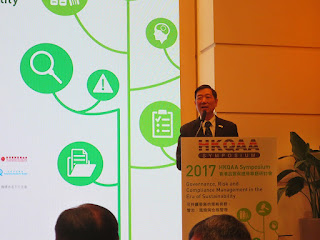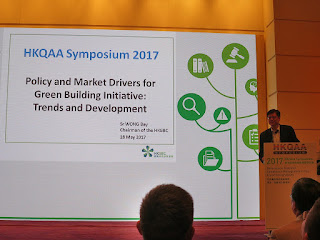HKQAA Symposium is key annual event organized by Hong Kong
Quality Assurance Agency (HKQAA) on 18th May 2017. Hong Kong Society for
Quality (HKSQ) is one of supporting organizations since 2006. The symposium’s frame in 2017 was “Governance, Risk and Compliance Management in the Era of Sustainability” and I summarized it below for sharing. Before the afternoon session, I met my old friend Dr. Nigel
Croft (ISO Technical Subcommittee on Quality Systems (ISO/TC176/SC2) and took a
photo for memory.
Then I
also took a photo with my old friend Mr. Ronald, YF Lau (Chairman, Hong Kong
Food Hygiene Administrators Association; Vice-President, Hong Kong Food
Council).
I met
one of speaker Dr. Mei Kei Ieong (CTO, ASTRI) (Left) and Mr. Jim Hui (Quality
Manager, ASTRI) (also our HKSQ member) and then we took a photo for memory.
Afternoon Session
Ir. C.S.
Ho (Deputy Chairman, HKQAA) gave an opening speech. He said it is the Era of Sustainability. HKQAA provided a platform through different
scheme such as CSR Index to sharing knowledge. It needed to review the trend of
urban planning. He believed that “Protect
Environment Better, We Live Better.”
The first
speaker was Ms. Phyllis Li, JP (Deputy Director of Planning (Territorial,
Planning Department, the Government of the HKSAR) and her topic entitled "Sustainable
Urban Planning Transcending 2030: Strategies for a Smart Green and Resilient
City". Beginning, she briefed the
Hong Kong 2030+ strategic planning and it aimed to update the territorial
development strategy to guide planning, land and infrastructure development,
and the shaping of the built and natural environment of Hong Kong beyond
2030.
Then Ms.
Phyllis Li briefed the global megatrends to us including Ageing Population, Scarcity
of Natural Resources, etc. Based on the
megatrends, Hong Kong context would be changed and we needed to plan to adopt
it. After that she overviewed HK 2030+
from Vision, to Overarching Planning Goal, to Three Building Blocks, and to
Conceptual Spatial Framework.
There
were three Key Strategic Directions and Actions.
1)
Planning for a Liveable High-density City
2)
Embracing New Economic Challenges and Opportunities
3)
Creating Capacity for Sustainable Growth
The
proposed Conceptual Spatial Framework in Hong Kong region was showed as follow
diagram.
Finally,
Ms. Li expected Smart, Green and Resilient City Strategy could achieve the
ultimate objectives on Low Carbon, City Efficiency, Climatic Resilience and
Quality Living. Lastly, she concluded
that technology and innovation will enable a new era of city development,
taking care of needs of the people, environment and nature.
Sr. Wong
Bay (Chairman, Hong Kong Green Building Council) was the second speaker and his
presentation named "Policy and Market Drivers for Green Building
Initiative: Trends and Development".
Mr. Wong briefed the Paris Climate Agreement to explain the important of
the Policy drivers.
Then he stated the market drivers on green building from 2008 to 2015. Client demand increased upto 40% and Environmental Regulations increased upto 35%. However, the Market demand and Right thing to do were decreased. But the World Green Building Trends 2016 stated the number 1 benefit of Green Building was Lower Operating Cost (upto 57%).
In Hong
Kong, human activities in buildings were responsible for 60% GHG emission and
90% Electricity use. The following
diagram showed the different market drivers for Green Building in Hong
Kong. Finally, Mr. Wong quoted
Lao-Zhuang wisdom to conclude the Green Building returning to nature.
Prof.
Alfred CM Chan (Chairperson, Equal Opportunities Commission, HK) was the third
speaker and his topic entitled “Ageing Society and Workforce: Managing
Challenges and Opportunities”. Firstly,
he briefed the context included world population trends and ageing in the
Asia-Pacific, as well as challenges on ageing in Hong Kong.
Prof.
Chan mentioned China population was number 1 in the global population in
2011. However, the number 1 population
would be India in 2050! Then he stated
the population ageing in Asia such as Japan, Korea, Singapore, Thailand,
Indonesia, Malaysia, and Philippine in 2050.
Fertility trends was decreasing and it was the global trend.
Since
Hong Kong total fertility rate was low (only 1.03, where world average is 2.53)
and life expectancy was high (about 82.4, where world average is 68.7), Prof.
Chan proposed a new approach to overcome this challenge. He proposed longer therm planning for older
adults as follows:
1.
Promote healthy lifestyles
2.
Early detection & intervention
3.
Promote access to employment and volunteering
4.
Support and encourage life-long learning
5.
Promote the use of technology
6.
Expand and improve the coverage of retirement protection
Finally,
he used one simple message for every citizen from young to old as conclusion
that Save Money, Save Health and Save Friends!
Dr. Mei
Kei Ieong (CTO, ASTRI) was the fourth speaker and his presentation entitled “Digital
Innovation and Re-industrialization: Implications for Operation and Security
Management”. Firstly, he introduced the
Intelligent Manufacturing (IM) that no worker involved in production line and
prevent human error and contamination; and Internet of Thing (IoT) that
employees monitor and control connected equipment in control center only.
Then Dr.
Ieong discussed recently WannaCry Ransomware cyber-attacks that IoT security
was very important. He suggested three
possible solutions included IoT Standardization, Blockchain to trace the attack
source and Artificial intelligence (AI) & machine learning. He also mentioned the ASTRI Security Lab
(ASL) established for cyber-security.
Finally,
he mentioned ICT infrastructure for smart city application and how ASTRI &
its partners to establish R&D Ecosystem.
The fifth speaker was Mr. Yu Kam Hung (Executive Committee member in China Real Estate Chamber of Commerce Hong Kong and International Chapter) and his topic was “Optimize Asset Performance, Manage Diversified Risks”. He introduced how to optimize asset performance and to manage diversified risks.
Mr. Yu
explained the definition of Asset Performance Optimization as follows:
1.
Maximize strengths and minimize weaknesses
2.
Maximize the monetary value and social value the asset creates
3.
Minimize the cost of producing that value
4.
Extend asset lifespan and reduce maintenance cost
He also
classified four categories of risks below.
1.
Systematic risk – risk that cannot be foreseen or avoided. In real estate, specific risk included
imperfect market and illiquid.
2.
Economic risk – risk due to over-exposure on certain asset class. Overweighting / Underweighting in certain
business sectors
3.
Location risk – risk due to over-exposure on certain location. Overweighting
/ Underweighting in certain geographical regions
4.
Political risk – risk caused by political uncertainties. Unstable
political environment; Possibilities of war etc.
Finally, he concluded that sustainable income could be
achieved throught optimization of asset performance and risk diversification.
The last
speaker in afternoon session was Dr. Nigel Croft (ISO
Technical Subcommittee on Quality Systems (ISO/TC176/SC2)) and his
topic entitled "From Sustainable Construction to Sustainable Procurement:
The Past and Future of ISO’s Sustainability Standards". In the beginning, he briefed the UN 2030
Sustainable Development Goals.
Those
sustainable development goals rearranged under People, Prosperity and Planet showed
as following diagram. Then Nigel quoted
Kofi Annan (Nobel Peace Prize 2001) statement that “ISO standards are crucial
to sustainable development as they are key source of technology know how”.
Then he
briefed the sustainable construction through Environmental, Economic and Social
aspects.
The
integrating ISO 26000 core concepts into purchasing were discussed.
ISO
20400 guidance on sustainable procurement was also mentioned. It was the standard as reference for Green
Procurement. He concluded that ISO had a
whole range of standards to support sustainable development and could help to
promote HK’s sustainability initiatives.
Panel Discussion was performed at the end
of Afternoon Session and
the guest moderator was Dr. Nigel Croft.
At the
end of the symposium, Dr. Micheal Lam (CEO, HKQAA) gave a closing remark. He said HKQAA played active role to promote
sustainable development.
Previous HKQAA Symposium:
2016: HKQAA
Symposium – Startups Registration Scheme Kicks off - https://qualityalchemist.blogspot.hk/2016/05/hkqaa-symposium-startups-registration.html
2014: HKQAA
25th Anniversary Forum & Celebration Cocktail Reception - http://qualityalchemist.blogspot.hk/2014/11/hkqaa-25th-anniversary-forum.html
2010:
Part 1 - http://qualityalchemist.blogspot.com/2010/11/hkqaa-symposium-2010-sustainability.html ;
2010: Part
2 - http://qualityalchemist.blogspot.com/2010/11/hkqaa-symposium-2010-sustainability_26.html
Reference:


























沒有留言:
發佈留言